 Petzlover
Petzlover Burmese is originated from United States but Chartreux is originated from France. Both Burmese and Chartreux are having almost same weight. Both Burmese and Chartreux has almost same life span. Both Burmese and Chartreux has same litter size. Burmese requires Low Maintenance. But Chartreux requires Moderate Maintenance
Burmese is originated from United States but Chartreux is originated from France. Both Burmese and Chartreux are having almost same weight. Both Burmese and Chartreux has almost same life span. Both Burmese and Chartreux has same litter size. Burmese requires Low Maintenance. But Chartreux requires Moderate Maintenance
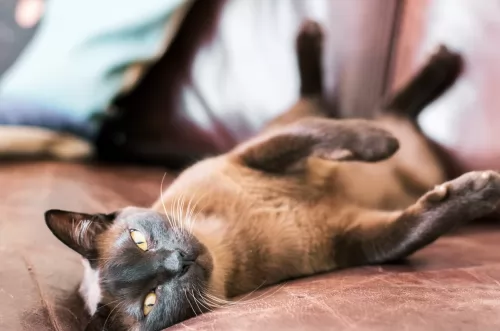 A dark brown cat together with Dr Joseph C. Thompson made their way from Burma to the United States in 1930. Cat fanciers believed that it was a dark-colored Siamese.
A dark brown cat together with Dr Joseph C. Thompson made their way from Burma to the United States in 1930. Cat fanciers believed that it was a dark-colored Siamese.
Dr. Thompson along with other breeders decided to breed the cat and she was the start of the Burmese breed.
Hybrids however, began appearing in the show hall in 1947. This was considered a violation of the show rules of the Cat Fanciers' Association and recognition of the Burmese was withdrawn until 1953. The Burmese Cat Society of America then had to give assurance to the registries that this type of thing would not happen again.
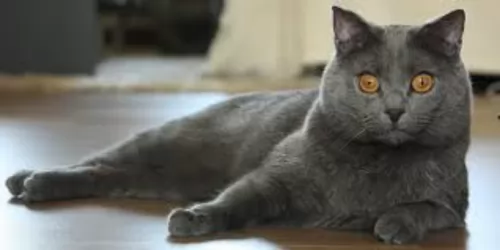 Hailing from France, the Chartreux cat is a rare cat breed but is still recognized by a number of cat registries around the world.
Hailing from France, the Chartreux cat is a rare cat breed but is still recognized by a number of cat registries around the world.
It’s not a new breed of cat, and in fact, the Chartreux is mentioned for the first time in 1558 in a poem and later on in paintings. There are quite a few legends as to the origins of the Chartreux and while some believe that the cats were brought to France by monks others believe that the Chartreux's ancestors were feral mountain cats from Syria.
European breeders kept the breed from extinction, especially after the 2nd world war, and the first Chartreux were brought to the United States in 1971. In 1987 the Cat Fancier’s Asociation advanced the Chartreux breed to championship status.
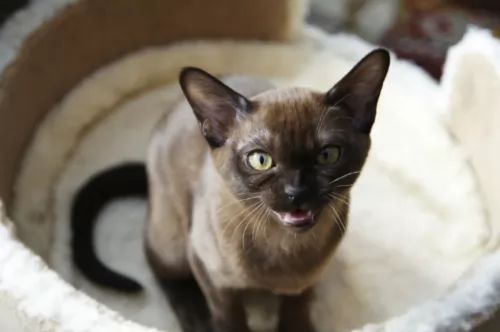 The Burmese is a medium-sized cat - fairly stocky and solid and weighs between 3 and 5kg.
The Burmese is a medium-sized cat - fairly stocky and solid and weighs between 3 and 5kg.
The dense, short coat of the Burmese comes in a variety of colors such as chocolate, cream, sable, red, tortoishell and solid colors too. The color you are most likely to see is sable.
It’s a low shedding cat so his grooming needs are low. The eyes, often a beautiful yellow shade, can be in different shades of yellow really.
Your gorgeous Burmese cat is a curious cat and finds exploring new places a huge adventure. They’re prepared to get on with some other pets in the home, but they may not be happy to welcome all cat breeds. The Burmese don't particularly like sharing their home and his human family with other cats in the home and love to get all the attention for themselves.
Once these cats mature, they do tend to settle down quite a bit and become placid, being a spectator to fun activities rather than a participant.
Still, they love their humans and are more than happy to find a place in the sun and to watch everyone from there.
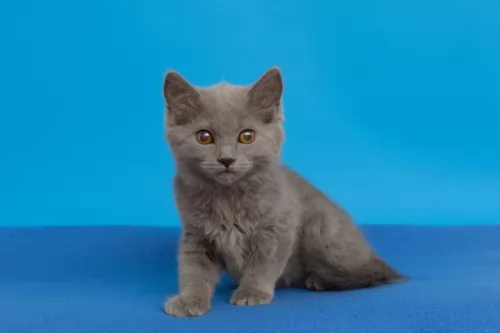 The Chartreux is a large, strong, stocky, muscular cat that can weigh anything between 4 to 7kg while some can weigh as much as 9kg.
The Chartreux is a large, strong, stocky, muscular cat that can weigh anything between 4 to 7kg while some can weigh as much as 9kg.
He has short legs when compared to the large body. He is known for his blue-like, silver-gray coat. In fact, the color can be any shade in the region of blue-grey. The coat is short, dense and double-coated and he has gold or copper-colored eyes.
People who have owned these cats say that they can take 3 to 4 years to reach maturity. Some people get mixed up and think this cat is very similar to the British Blue but they are two different breeds altogether.
The Chartreux is a real lap-cat just loving being able to settle down into his human owner's lap. It’s a cat with a 'smiling’ face because of the structure of his muzzle.
He is a very affectionate cat and will follow his people much like a dog. He is very intelligent and quiet and adapts well to a new situation. It's a cat that loves to climb so you will need to invest in a climbing tree for him as well as a scratching pole.
He is a good cat for first-time cat owners as well as being a good friend in homes with well brought up children. He is able to be friendly with other pets in the house.
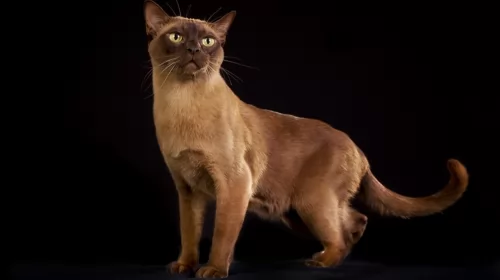 The Burmese cat loves to climb and survey his world from a high perch so don’t forget to invest in some kind of climbing apparatus or cat tree for him.
The Burmese cat loves to climb and survey his world from a high perch so don’t forget to invest in some kind of climbing apparatus or cat tree for him.
He tends to become a bit inactive as he gets older and this can be a problem and lead to obesity. Encourage your Burmese cat to come out and play to make sure he gets enough exercise.
He loves being noticed by his human family and will thrive on being petted and noticed, and of course, you’ll want to, as a Burmese has got a whole love of loving to give you too.
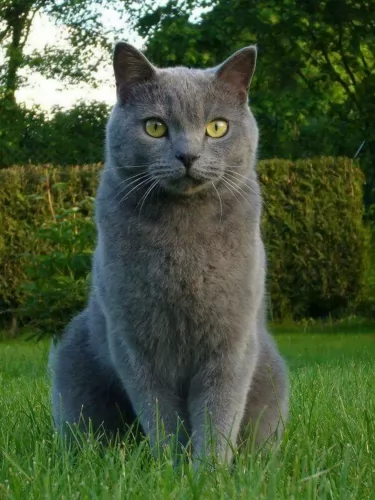 Although this is a large, strong cat, he is actually a gentle feline in nature and he doesn’t like being part of any bickering among his human family, preferring to run away. He also doesn’t like being spoken harshly to when he has done something wrong.
Although this is a large, strong cat, he is actually a gentle feline in nature and he doesn’t like being part of any bickering among his human family, preferring to run away. He also doesn’t like being spoken harshly to when he has done something wrong.
This cat isn’t an extrovert by any means but he isn’t particularly shy either and enjoys spending time with his human family.
He isn’t a demanding cat but is easy-going, just wanting to get on in life and he promises to make you a steady, loyal companion.
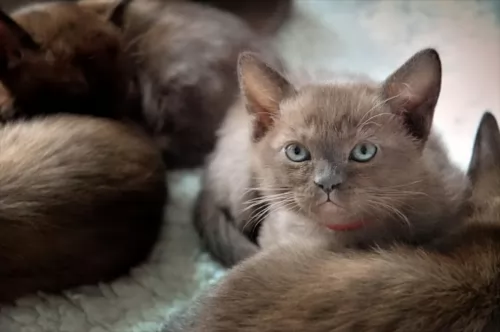 These cats are a healthy breed and if you take good care of your Burmese he can live to up to 13, 14 or 15 years of age.
These cats are a healthy breed and if you take good care of your Burmese he can live to up to 13, 14 or 15 years of age.
But you have to be aware of diabetes mellitus as well as something known as hypokalaemic polymyopathy – muscle weakness because of low blood potassium levels.
You’ve also got to look out for obesity as these are sturdy, stocky cats and overeating can lead to obesity and a host of health issues such as painful joints and diabetes.
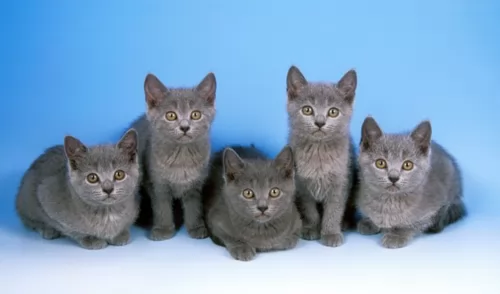 These cats are particularly prone to dental problems. The reason for this is that their incisors are closely set together and small.
These cats are particularly prone to dental problems. The reason for this is that their incisors are closely set together and small.
Because of the heaviness of this cat, the Chartreux is also prone to a disease known as patellar luxation or kneecap displacement. This problem can eventually lead to lameness. One way to avoid this particular problem is to rather get your kittens from reputable breeders.
These cats are much inclined towards weightiness so you have to be watching his diet carefully, more so because the cat is prone to patellar luxation.
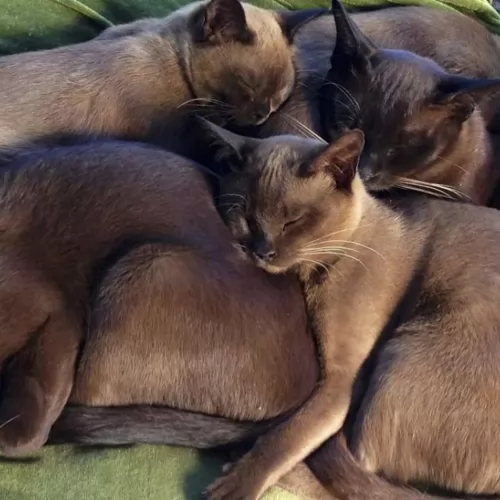 Burmese cats are naturally good climbers and you will need to provide these cats with some kind of climbing tree or something else where they can climb and perch.
Burmese cats are naturally good climbers and you will need to provide these cats with some kind of climbing tree or something else where they can climb and perch.
While adult Burmese cats tend to be fairly placid cats, they still love to play and love the interaction between themselves and their humans. As he gets older, don’t forget to keep up a regular playtime with him.
Shedding is minimal with the Burmese cat and weekly brushing will be a good bonding session and also keep your Burmese cat’s coat healthy and shiny by removing dust and loose hair.
Your fur child requires the best – a balanced cat food packed with protein to support him in all his activities and to ensure he maintains a good weight.
There are many excellent commercially manufactured cat foods on the market so learn to understand the ingredients and what nutrients are required.
Certainly, your Burmese kitten will require a complete and balanced kitten food with all the right nutrients to ensure good bone and coat growth. Then it is time to choose a kitten food which will later change to adult food as your kitten matures.
There are excellent cat foods for every stage and season of your cat’s life and from top brands – people who know the needs of cats.
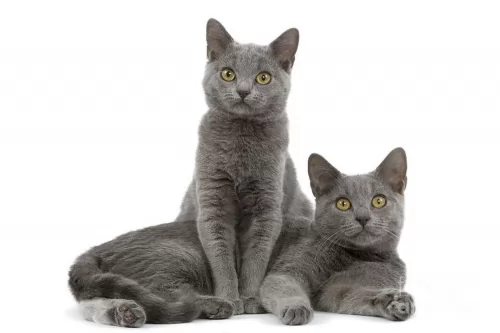 Your Chartreux cat’s dense, double coat will require brushing once or twice a week, especially in the cat’s seasonal shedding period.
Your Chartreux cat’s dense, double coat will require brushing once or twice a week, especially in the cat’s seasonal shedding period.
This cat doesn't take well to changes in his diet, particularly when he finds a type of food that he likes, then he wants to stick to that. You want to feed your cat a top-quality food to encourage good health but you want to avoid overfeeding as obesity in cats comes with lots of problems. A cat is a carnivore and you therefore need to feed your cat a diet rich in protein. Speak to your vet or another cat expert who can advise you on feeding your cat if you are in any kind of doubt. Make sure your kitty kat has a never-ending supply of fresh, cool water.
Always make a point of checking inside your cat's ears as well as inside his mouth for bad teeth. Bad teeth can cause terrible pain and your pet has no way of communicating this to you.
Have your cat neutered or spayed if you don't want your cat to have kittens.